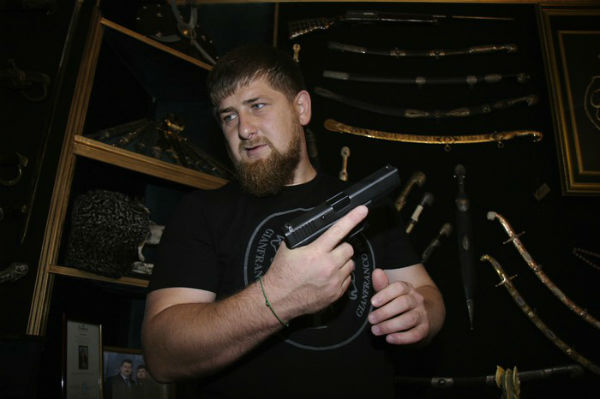
Joshua Yaffa writes: Since 2001, to keep the peace, the Russian government has flooded Chechnya with cash, including at least fourteen billion dollars for postwar reconstruction. Today, more than eighty-five per cent of Chechnya’s budget comes from Moscow. Another untold sum comes from an opaque fund named after Kadyrov’s father, which is financed by business owners and public employees — who are informally required to pay a portion of their income to the fund — and by Chechen oligarchs paying tribute to [Chechnya’s leader — shown above — Ramzan] Kadyrov. The fund, in turn, disburses money for everything from repairing local hospitals to sending Chechens to Mecca for the hajj. Chechen officials have said that donations to the foundation are voluntary, but a staff member at a public institution in Grozny told me that as soon as the workers’ salaries are deposited they get a call from a superior, asking for around thirty to fifty thousand rubles, or four to six hundred dollars. “One time, he explained it was for organizing a big soccer match,” the person said. “Other times, he doesn’t give any explanation at all.” The fund, an indulgence granted to no other Russian governor, frees Kadyrov from complete financial dependence on the Kremlin.
Since succeeding his father, Kadyrov has wrested power not just from the Russian generals and intelligence officers who once oversaw Chechnya but also from internal rivals hailing from other prominent Chechen clans. In this, he resembles Putin, who built what has been called a “vertical of power” across the whole of Russia under his centralized authority. Chechnya is far smaller and more homogenous, so Kadyrov’s power is even more pronounced. Putin has eliminated opponents largely through political trickery and co-optation, reserving outright force for rare occasions. Kadyrov prefers blunter, unmistakably violent means.
For many years, Kadyrov’s chief rivals were the Yamadayev brothers, who had powerful patrons in Moscow. In 2008, Ruslan Yamadayev, a member of the Russian parliament, was shot and killed in his car, outside the Russian White House, the chief office of government administration in Moscow; in 2009, his younger brother Sulim was killed in the parking garage of a luxury apartment tower in Dubai, where he was living under an assumed name. A Dubai court tried and convicted two men, including an Iranian who worked as a stable hand for Kadyrov—Kadyrov keeps racehorses in Dubai — for carrying out the assassination. Dubai police testified in court that Adam Delimkhanov — Kadyrov’s closest ally, enforcer, and heir apparent — provided the killers with the murder weapon, a gold-plated 9-mm. pistol, and they put him on the Interpol wanted list. Delimkhanov denied involvement. He is a deputy in the Russian parliament, and maintains an unblemished legal record in Russia—though he once got into a fistfight with another deputy inside the parliament building in Moscow and a gold-plated handgun fell to the floor beside him. A third Yamadayev brother, Isa, published an open letter in a Moscow newspaper in 2009, claiming that Kadyrov had tried to kill him, but he reached an apparent truce with Kadyrov the next year. The end of the Yamadayev brothers as a political force left Kadyrov with nearly unchecked power. “These were strong guys with connections to the F.S.B.,” the successor agency to the K.G.B., Alexey Malashenko, an expert on the Caucasus at the Carnegie Moscow Center, told me. “But it turns out that even the F.S.B. couldn’t defend them, because Kadyrov isn’t protected by the F.S.B., or by the state writ large, but by Putin himself.” [Continue reading…]

